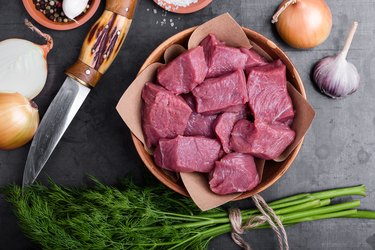A beef roast is a dish that is popular worldwide. It is a classic dish that is always a crowd-pleaser. Even though there are so many people who cook beef roasts, they still require a lot of technical skill. The right spice mixture and cooking time are the two elements that can make or break the entire recipe.
Cooking a beef roast frequently involves both properly cooking the meat and storing it to keep it fresh. If not stored with caution, beef can easily go bad. Nobody wants to cook a beef roast with meat that is bacterially contaminated and smells bad.
There are a number of considerations to make your beef roast tasty and healthy. Simply adding spices and letting the beef cook won’t result in a tasty roast. Instead, the freshness of the meat is what matters most.
Fresh beef yields delicious results in a roast. In contrast, consuming a bad beef roast will make you feel hungry and upset your digestive system. And no one wants to consume a beef roast and then have an upset stomach.
Identifying Bad or Rancid Meat
Fresh meat typically has a faint aroma or none at all. In comparison, rancid meat smells strange. If the meat in your refrigerator smells sour, sulfurous, or like ammonia, it has gone bad.



As meat goes bad, it usually takes on grayish undertones. Bad meat is likely to have notable discolorations. Typically, green and gray-green tints or spots indicate bacterial growth.
Your meat’s texture can also indicate whether or not it has gone bad. Fresh meat should be firm and slightly moist. Your meat has probably been contaminated by some kind of microbe if it is slimy or sticky.
Not all microbes are dangerous. On the other hand, if your meat is tainted with harmful bacteria like salmonella, staphylococcus, clostridium, or E coli, you can become very sick from food poisoning. According to the Mayo Clinic, symptoms of food poisoning include stomach pain, nausea, vomiting, fever, diarrhea, and other gastrointestinal problems.



There is no guarantee that cooking and consuming spoiled pork, stale chicken, or any other bad meat will make you ill, though. Whether or not you fully cooked your food will also affect whether you get sick.
Many bacteria can be killed during the cooking process. For instance, you might not get sick if you made a long-cooked stew or soup with boiled meat.
However, heat isnt a guaranteed way to prevent food poisoning. This is because certain bacteria also release toxins, according to the Mayo Clinic. Even when you kill these bacteria by cooking them, their toxins will remain in the food and cause you to become sick.
Preventing Meat From Going Bad
According to the U. S. Food and Drug Administration, you should always keep meat and meat products in your refrigerator at 40 degrees Fahrenheit. This helps prevent spoilage. However, the duration of time meat can be kept at this temperature depends on the product. The FDA states that:
- Poultry can be kept in your refrigerator for two days.
- Your refrigerator can hold ground meat, including sausages, for two days.
- For one to two weeks, hot dogs can be stored in the refrigerator.
- Bacon can be kept in your refrigerator for 7 days.
- For up to five days, steaks can be kept in the refrigerator.
- You can keep offal (organ meat) in your refrigerator for 2 to 5 days.
Meat that is kept at 40 degrees Fahrenheit for any length of time will gradually begin to rot.
Freezing Meat and Meat Products
If you dont plan on eating your meat within the FDA-recommended time periods, you can keep your meat from going bad by freezing it at 0 degrees F. The USDA says that freezing food at this temperature inactivates bacteria and other microbes. Freezing food can even help destroy certain parasites.
According to the USDA, food can technically be stored at 0°F indefinitely. However, if you keep your meat in the freezer for too long, the quality will suffer. The FDA recommends the following limits:
- Poultry to be frozen for up to 12 months.
- Ground meat to be frozen for up to 4 months.
- Hot dogs to be frozen for up to2 months.
- Bacon to be frozen for up to 1 month.
- Steaks to be frozen for up to 12 months.
- Organ meat to be frozen for up to 4 months.
Whether its fresh or frozen, meat needs to be cooked thoroughly to kill all bacteria thats present in it. The U.S. Department of Health and Human Services says you should cook most meats to an internal temperature of 145 degrees F. Poultry needs to be cooked to a slightly higher internal temperature of 165 degrees F.
People Are Reading 1
How can I tell if my meat’s gone bad?
FAQ
What happens if you eat spoiled roast beef?
Effects of consuming spoiled ground beef Spoiled ground beef is hazardous to consume because it may contain pathogenic bacteria that cause foodborne illnesses. Fever, nausea, cramps in the stomach, and diarrhea, which may be bloody, are some symptoms (9, 10, 11).
How do you tell if roast beef is bad?
Therefore, spoiled meat will have a sour or tangy flavor that matches how it smells. This is a reminder to visit the hospital right away if you feel sick after eating spoiled meat.
What to do if you eat spoiled beef?
Spoiled meat has a strong odor that still smells like steak but also has ammonia undertones. Some steaks may also have an egg-like smell. If your steak smells unpleasant and has passed its expiration date, it’s probably not safe to eat.
